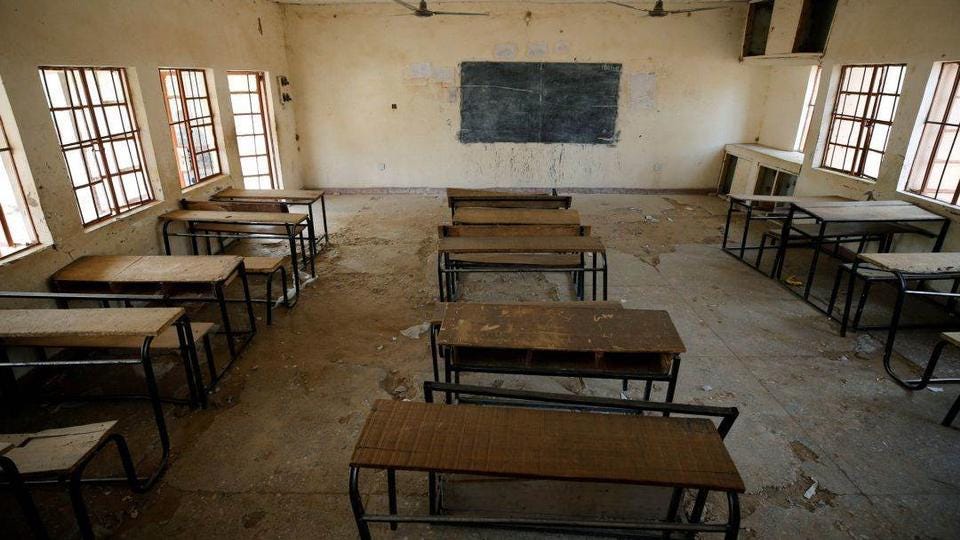It’s Friday!
This newsletter is about politics, economics, and culture in Nigeria. More of the first two though. So if you are interested in these topics, please subscribe. Or if you know someone who might be interested, do share.
I publish once a week, so definitely not spamming your mailbox.
And I’ll be chuffed to hear your thoughts. My email is solomon.elusoji@gmail.com.
I met an ASUU State Chairman this week. A Professor. We were standing outside, under a sharp sun. He said, “I have been receiving the same salary since 2009.” It wasn’t a call for pity. He wore a wry smile, almost sarcastic. “The highest-paid professor in my University,” he said, “has a net pay of N416,000.”
This week, the academics downed tools for the umpteenth time. According to this chart, it's the 16th time since 1999. And since 2009, they’ve been asking for basically the same thing: pay us more, improve university infrastructure, give us more freedom to run our own affairs, etc.
Depending on who you ask, you’ll hear claims like the Federal Government is owing ASUU N132 billion in earned allowances. And government talking heads would be like, we’ve paid so-so billions, the academics are just impatient and greedy and unpatriotic.
It’s a circus that never ends.
On hearing about the latest strike, the Minister of Labour Chris Ngige, who has in the past spearheaded the Federal Government’s negotiations with the academics, said the academics did not give prior notice. “You can not just go on strike like that, it is illegal,” he said. “So they are just on leave. We will work with them and they will call off the strike.”
Everything is funny to Ngige, a man who said last year that Nigeria’s healthcare system is “fairly okay”. But the academics are not just on leave. Classroom activities across public universities have been grounded and a collective darkness has taken the place of light.
Like everything in Nigeria, one needs to ask: who benefits from this dysfunction?
One of ASUU’s demands is the replacement of the payroll system IPPIS with the University Transparency Accountability Solution (UTAS). According to a report from the Auditor-General of the Federation in 2016, IPPIS is a system with critical audit issues. On Tuesday, more than six years after that report, the House of Representatives summoned top IPPIS officers over payroll fraud.
“They are finding it difficult to deploy it (UTAS) because it will no longer be business as usual,” the ASUU State Chairman told me. “Whatever you do there is recorded for life.”
Meanwhile, university governance remains heavily steeped in civil service bureaucracy. According to the ASUU State Chairman, universities have to seek approval from the Head of the Civil Service of the Federation to hire an academic. And recruitment is usually conducted through the allocation of political slots. So there is little incentive to retain the best brains in public universities.
ASUU itself is a victim of the system, as anyone who has attended a Nigerian public university will attest to. The poor quality of instructors is positively correlated with inadequate funding for the institutions and unnecessary meddling. One can argue that they don’t deserve more money because they don’t have the ‘brains’ to use it efficiently, because it will be flushed down the murky waterways of university corruption. But whose responsibility is it to fix Nigeria’s comatose schools?
Five other things
Fuel queues intensified across Nigeria this week after bad fuel was imported into the country. The NNPC has assured Nigerians that the queues will vanish in the coming days but no one in the top brass has resigned or been sacked. Meanwhile, as the nation groaned, the Minister of Petroleum jetted out on Tuesday to Brussels to fraternise with other world leaders.
The GDP numbers for 2021 are in and unsurprisingly the economy completed its recovery from the recession of 2020. The 3.4% growth was the strongest since 2014 after the Buhari administration oversaw two recessions in six years.
President Buhari has asked the National Assembly to approve an additional N2.557 trillion for fuel subsidy payments after his government postponed its removal. This, of course, means less money is available to spend on critical sectors like power and education.
Supercop Abba Kyari was detained this week after drug agency NDLEA accused him of being part of an international drug trafficking cartel. Mr Kyari is still being wanted in the US for his relationship with convicted fraudster Hushpuppi.
And after nearly 10 years of battling a jihadist insurgency, France announced plans to withdraw its troops from Mali. But they are not leaving the Sahel just yet. French troops will remain in countries like Niger Republic and Chad.




